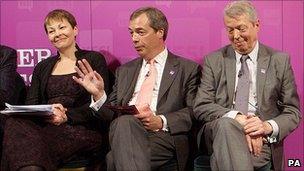AV referendum: 'Real dilemma' for Labour says Johnson
- Published

Alan Johnson has said the issue of voting change is a "real dilemma" for his party as the No campaign in the AV referendum claimed a majority of Labour MPs were backing it.
The ex-home secretary acknowledged the party was split on the issue and that many believed Labour was more likely to win power under the current system.
But he suggested "radical, progressive" elements in the party favoured change.
The No campaign says 131 Labour MPs support first-past-the-post.
Senior Labour figures have been trading blows over the issue in recent days ahead of the 5 May poll - in which people will be asked whether they want to switch from first-past-the-post to the alternative vote.
'Disempowering'
Former Cabinet minister David Blunkett, a patron of the No campaign, told the Times that more than half of Labour MPs - 131 in total - now opposed a switch to AV.
This is despite Labour leader Ed Miliband and the majority of the shadow Cabinet urging a "Yes" vote in the poll.
Mr Johnson, a longstanding supporter of changing the system for electing MPs, was asked about Labour's position during a cross-party "Yes" campaign event also attended by Lib Dem President Tim Farron, Green Party leader Caroline Lucas and UK Independence Party leader Nigel Farage.
"No party is split apart from the Labour Party," he said. "For us, the issue is a real dilemma because we can win power through first-past-the-post."
He called for the party to conduct a "healthy debate" over the issue, comparing the situation to the 1975 referendum on remaining in the EEC during which Labour cabinet ministers campaigned on different sides of the argument.
Arguing that Labour voters could be crucial in determining the outcome of the referendum, he said the current system for Westminster elections was "miserably disempowering" and "belonged in the past".
"I can't imagine anybody joining a radical, progressive party like the Labour Party and thinking the electoral system is absolutely perfect and does not need to change," he said.
"Deep in people's hearts and, leaving aside political advantage, that is what Labour activists believe."
He was speaking after Mr Blunkett said 131 out of Labour's 258 MPs had endorsed the "No" campaign, as well as two thirds of Labour peers and 85% of its councillors.
'Self-interest'
Senior Labour politicians have been arguing over who is likely to benefit most from a "Yes" vote with former Business Secretary Lord Mandelson saying it would make life more difficult for the Conservatives - who oppose it - and destabilise the coalition.
But Shadow Health Secretary John Healey said retaining first-past-the-post was in the interest of both his party and the country as a whole.
"I think the majority of Labour MPs have always been in favour of the current system," he told the BBC's Daily Politics.
"One person, one vote is what our system has been based on. I don't like the idea that some people's votes will be counted, under this new system, two, three, four or five times."
With only a week of campaigning left, both sides have been stepping up their efforts.
Lib Dem President Tim Farron said the current system "pre-dated both slavery and the Empire", claiming it had enabled Margaret Thatcher's government in the 1980s to pursue "wicked" economic policies and the Blair government to commit UK forces to the Iraq invasion.
Ms Lucas and Mr Farage said they supported a proportional system of voting but AV was a step in the right direction and warned the issue of the way Britain elects MPs would be "buried" for decades if the "Yes" campaign lost the vote.
But Mr Farage also warned that "too many people in the Yes campaign had resorted to personal abuse".
The No campaign said the support of a majority of Labour MPs "demonstrates what we have seen across the country for quite some time - that Labour voters are voting No in large and significant numbers".
- Published1 April 2011